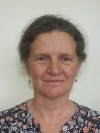Winnifred Kansiime Kimara
ID: UNCST-2021-R012131
|
Predictors of indoor air quality in Kisenyi-Mugunu a slum settlement in Fort Portal Municipality, Uganda
REFNo: HS695ES
General objective
To assess predictors of indoor air quality so as to promote the health of children under five dwelling in Kisenyi-Mugunu, Fort Portal Municipality.
Specific objectives
1. To determine the level of IAQ in Kisenyi-Mugunu, Fort Portal Municipality.
2. To establish the predictors of IAQ in Kisenyi-Mugunu, Fort Portal Municipality.
3. To explore the barriers and facilitators to uptake of healthier household energy options in Kisenyi-Mugunu.
|
Uganda |
2020-11-18 |
2023-11-18 |
Medical and Health Sciences |
|
Non-degree Award |

|
Jackson Orem
ID: UNCST-2021-R012016
|
Characterizing Determinants of Primary KSHV Infection among Children and Adolescents in Uganda
REFNo: HS735ES
1. To determine the incidence and to define the viral, immunologic, and clinical features of primary KSHV infection.
2. To identify the biologic and behavioral risk factors associated with primary KSHV infection.
3. To develop mathematical models that characterize KSHV shedding dynamics and virologic drivers required for transmission.
|
Uganda |
2020-11-18 |
2023-11-18 |
Medical and Health Sciences |
|
Non-degree Award |

|
Irene Andia Biraro Rebecca
ID: UNCST-2019-R001475
|
Machine Learning and Secondary Data Analyses of the RASHOTS Database to Guide Clinical Decision Making and Predict Patient Prognosis at Kiruddu National Referral Hospital, Uganda
REFNo: HS745ES
The primary project objectives are:
1. To utilise ML methods to estimate the risk of mortality on the ID wards at Kiruddu National Referral Hospitals using the RASHOTS medical database
2. To develop prognosis prediction scores for survival on the ID wards using ML methods on the RASHOTS medical database based on clinical prognostic factors
The secondary project objectives are:
1. To estimate the prevalence of major mortality drivers such as tuberculosis, tetanus using the RASHOTS medical database
2. To create a prognosis prediction protocol for risk of tuberculosis related mortality as a computer application for use by clinicians on ID wards
3. To use the RASHOTS database for quality improvement in clinical care and practice in the department of Internal Medicine
|
Uganda |
2020-11-18 |
2023-11-18 |
Medical and Health Sciences |
|
Non-degree Award |

|
Annette Namugaya Mugabe Jane
ID: UNCST-2020-R014795
|
TRENDS AND INDICATIONS FOR
CAESAREAN SECTION IN MBALE REGIONAL REFERRAL HOSPITAL
A CROSS SECTIONAL STUDY
REFNo: HS777ES
General Objective
To determine the trends and indications for caesarean section delivery in MRRH (Eastern Uganda) during the study period (July 2013 to June 2018)
Specific Objectives
1. To determine the trend for caesarean section in MRRH (Eastern Uganda) over the study period
2. To identify the indications for CS delivery in MRRH (Eastern Uganda) over the study period
|
Uganda |
2020-11-18 |
2023-11-18 |
Medical and Health Sciences |
|
Degree Award |

|
Peter Rukundo Milton
ID: UNCST-2020-R014799
|
Next Generation Nutrition in Uganda: Enhancing Dietary Intake of Iron and Folic Acid in a Culturally Acceptable Food Product for Pregnant Women to Improve Maternal and Child Outcomes
REFNo: HS828ES
Evaluate the effect of the innovative product on the health outcomes of the infants at birth,Investigate the efficacy of this innovative product to reduce iron and folic acid deficiency in pregnant women.,Develop a culturally acceptable and quality assured iron bio-fortified beans and silverfish pre-cooked instant sauce fortified with iron and folic acid to meet nutritional needs for pregnancy.,
|
Uganda |
2020-11-18 |
2023-11-18 |
Medical and Health Sciences |
|
Non-degree Award |

|
Irene Andia Biraro Rebecca
ID: UNCST-2019-R001475
|
The Trends in Clinical Presentation and Management of Diseases among Adults attending Kiruddu National Referral Hospital, Kampala: Review of Medical Records.
REFNo: HS1030ES
General objective
To analyse medical records for trends in presentation and management of disease conditions in the in-patient department (IPD) and out-patient department (OPD) at KNRH from 2019 to date.
Specific objectives
I. To describe trends of respiratory disease presentation and clinical management among adult patients presenting to the IPD, medical and general OPD at KNRH during the study period (January to July 2020) compared to the baseline period (January to July 2019)
II. To explore for any collateral effects of the global SARS-CoV-2 pandemic on chronic disease presentation and management at KNRH during the same study period.
|
Uganda |
2020-11-18 |
2023-11-18 |
Medical and Health Sciences |
|
Non-degree Award |

|
Waiswa Peter
ID: UNCST-2020-R014921
|
AN ASSESSMENT OF THE IMPACT OF COVID-19 ON RMNCAH AND HIV SERVICE DELIVERY AND UTILIZATION IN UGANDA
REFNo: HS1084ES
1. To document the response actions for mitigating the impact of COVID-19 on RMNCAH and HIV services at national, sub-national, health facility and community levels
2. To assess the district, health facility and community preparedness to provide RMNCAH and HIV services during the pandemic.
3. To obtain information on the implications of COVID-19 on the level of access and utilization of routine RMNCAH, HIV and other health services
4. To explore the effects of COVID-19 pandemic on mental health, intimate partner violence and gender roles
5. To assess the effects of COVID-19 on early child development, food security, feeding practices and nutrition among children under five years.
6. To generate recommendations for informing future national policy and public health response to health emergencies
|
Uganda |
2020-11-18 |
2023-11-18 |
Medical and Health Sciences |
|
Non-degree Award |

|
Bonnie Fournier
ID: UNCST-2019-R000250
|
Reducing HIV-related Stigma in School Children
REFNo: HS510ES
Specific research objectives:
◠Objective 1: To assess the magnitude of change, among young people who receive the arts-based intervention, in measures of stigma (i.e., enacted, internal, anticipated, courtesy, and perceived), HIV knowledge and attitudes towards young people who are HIV+ and –affected;
â— Objective 2: To assess the intervention effect on HIV testing behavior among HIV-negative sexually-active young people;
â— Objective 3: To assess the intervention effect on linkage to care, initiation of Antiretroviral Therapy (ART), and adherence to ART among HIV+ young people;
â— Objective 4: To evaluate how, and under what circumstances, the intervention had an effect.
|
Canada |
2020-11-17 |
2023-11-17 |
Medical and Health Sciences |
|
Non-degree Award |
-Edit.jpg)
|
Imelda Bates
ID:
|
Development of a complex quality improvement intervention for timely blood transfusions for the management of postpartum haemorrhage (PPH) in Uganda
REFNo: HS579ES
1. To map out active transfusing facilities and blood centres in two districts in Uganda and create a profile of baseline measures of quality of PPH management and blood transfusion services (e.g. availability of blood, safety of blood, timeliness of referrals of women with PPH, regular measurement of haemoglobin in PPH patients) for each district
2. To determine key barriers to the appropriate management of PPH, including blood transfusion
3. To gain stakeholder buy-in and contribution to a lead-on quality improvement intervention’s design from all levels, with a specific view to feasibility and sustainability
|
UK |
2020-11-17 |
2023-11-17 |
Medical and Health Sciences |
|
Non-degree Award |

|
Alison Elliott
ID: UNCST-2023-R006524
|
“Establishing a Single-Sex Controlled Human Schistosoma mansoni Infection Model for Uganda: Safety and Dose Finding†(CHI-S-Ug1)
REFNo: HS697ES
Primary objective: To investigate (1) the safety and tolerability and (2) the infectivity of male Schistosoma mansoni (Sm) cercariae in healthy adult Ugandan volunteers with (a) minimal prior exposure to Sm, and (b) intense prior exposure to Sm.
Exploratory objectives: To investigate the kinetics of controlled infection with male Schistosoma mansoni cercariae in healthy adult Ugandan volunteers (a) with minimal prior exposure to Sm, and (b) with intense prior exposure to Sm. To investigate immunological, metabolic and microbiome changes after infection with Schistosoma mansoni male cercariae. To investigate volunteer and wider community understandings of CHI in the context of CHI-S.
|
UK |
2020-11-17 |
2023-11-17 |
Medical and Health Sciences |
|
Non-degree Award |

|
Adegbola Tololupe Adesogan Carola
ID:
|
FEED THE FUTURE PESTE DES PETITS RUMINANTS VACCINE ASSOCIATE AWARD
REFNo: A77ES
In the course of the pilots, the project will conduct:
• A rapid assessment of existing information and surveillance activities to identify the most relevant actions to reinforce surveillance and epidemiological assessments capacity and information.
• At least one training workshop to enhance skills and establish epidemiological monitoring systems that meet both disease control and project applied research needs.
• Targeted sero-sampling designed for the estimation of the basic reproductive number.
• Participation in the investigation of outbreaks and facilitation of the collection of material for viral isolation and genomic analysis.
• Mapping of virus flows and modeling of disease transmission as an approach to integrating data from diverse sources.
• Areas targeted will be points of high virus circulation and will have substantial levels of PPR antibody; the project will measure the impact of vaccination on herd immunity and the frequency of disease events.
|
USA |
2020-11-17 |
2023-11-17 |
Agricultural Sciences |
|
Non-degree Award |

|
John Ssempebwa
ID: UNCST-2020-R014966
|
ASSESSMENT OF STATUS AND DEVELOPMENT OF FRAMEWORK AND
GUIDELINES TO IMPROVE HEALTH AND SAFETY OF SWIMMING POOLS IN
THE GREATER KAMPALA METROPOLITAN AREA, UGANDA
REFNo: HS730ES
Objectives
1. To determine the physio-chemical and microbiological quality of water in swimming pools.
2. To determine the knowledge, and practices of swimmers and operators regarding safety of
swimming pools.
3. To establish the hygienic and safety status at the swimming pools premises.
4. To establish a framework and guidelines to regulate operation of swimming pools in Uganda.
|
Uganda |
2020-11-17 |
2023-11-17 |
Medical and Health Sciences |
|
Non-degree Award |

|
Jonathan Nsamba
ID: UNCST-2024-R003888
|
Body composition and muscular health of children and adolescents diagnosed with type 1 diabetes mellitus in Uganda
REFNo: HS759ES
1. To determine the body composition of children and adolescents diagnosed with T1DM as compared to their closely matched sex and age controls.
2. To determine the hand grip strength of children and adolescents diagnosed with T1DM as compared to their closely matched sex and age controls.
3. To examine the associations between dietary intake patterns, physical activity, nutrition status and body composition among children and adolescents diagnosed with T1DM
4. To understand the perceptions of newly diagnosed Type 1 Diabetes Mellitus children and adolescents about their disease status, barriers and facilitators to self-care.
|
Uganda |
2020-11-17 |
2023-11-17 |
Medical and Health Sciences |
|
Degree Award |

|
FADHIL GERIGA
ID: UNCST-2022-R011524
|
Optimizing Nephroblastoma treatment outcomes in Uganda
REFNo: HS822ES
Primary Objectives:
o To determine the one-year survival of children with pathology confirmed nephroblastoma treated with multidisciplinary, stage-based care in Uganda.
o Assess the factors associated with morbidity and mortality among children with nephroblastoma.
Secondary Objectives:
o Characterize the frequency and spectrum of other malignancies that present similar to Nephroblastoma
o Characterize the social needs and health literacy of nephroblastoma patients and their caregivers at the UCI
o Assess quality measures of a multidisciplinary care, including:
- Treatment timing benchmarks following guidelines developed for UCI
- Adherence to treatment plan and elimination of loss to follow-up
o Assess social needs and provide a patient navigator for families of children with nephroblastoma and reduce the non-clinical barriers to care for children with nephroblastoma
Exploratory Objectives:
o To collect plasma for future studies evaluating circulating tumor DNA as a tool for diagnosis of pediatric kidney cancers and monitoring of patients with nephroblastoma.
o Collect stool specimens for future studies to define baseline factors in the stool microbiome that are associated with neutropenic fevers, sepsis and 12 months survival using combination of sequencing methods and stool ova and parasites evaluation.
|
Uganda |
2020-11-17 |
2023-11-17 |
Medical and Health Sciences |
|
Non-degree Award |

|
Christine Nalwadda Kayemba
ID: UNCST-2020-R014220
|
EXPLORING CHILDREN’S UNDERSTANDING OF COVID-19 AND ITS PREVENTIVE STRATEGIES IN UGANDA: A CROSS SECTIONAL STUDY AMONG CHILDREN AGED 10-13 YEARS IN HOIMA DISTRICT
REFNo: HS830ES
General objective
To explore children’s understanding of COVID-19 disease and related preventive measures, in order to generate information that will guide the development of evidence-based strategies for strengthening and improving children safety and wellbeing during and after the COVID-19 crisis.
Specific objectives
1.To establish the children’s knowledge of COVID-19 transmission and its preventative measures in Hoima Municipal Council
2.To describe how the COVID-19 preventative measures are understood and practiced by children aged 10 to 13 years in Hoima Municipal Council
3.To explore the enablers for the recommended health measures for the prevention of COVID -19 among children aged 10 to 13 years in Hoima Municipal Council
4.To explore the barriers for the recommended health measures for the prevention of COVID -19 among children aged 10 to 13 years in Hoima Municipal Council
|
Uganda |
2020-11-17 |
2023-11-17 |
Medical and Health Sciences |
|
Non-degree Award |
.jpeg)
|
Doreen Nakimuli
ID: UNCST-2021-R013668
|
Formative Study to Understand Drivers and Barriers to Uptake of Permanent Methods of Family Planning Among Men and Women in Busoga Sub region
REFNo: HS862ES
The overall objective is to understand the factors that influence women, men and providers in Busoga region during the journey to access PMs to enable PSIU to design interventions.
|
Uganda |
2020-11-17 |
2023-11-17 |
Medical and Health Sciences |
|
Non-degree Award |

|
NAUME MUYANGA
ID:
|
UNDERSTANDING THE IMPACT OF GENDER BASED VIOLENCE ON HIV/AIDS PREVENTION AND TREATMENT HEALTH SEEKING BEHAVIORS AMONG TRANSWOMEN IN THE GREATER KAMPALA METROPOLITAN AREA, UGANDA.
REFNo: SS557ES
Broad objective:
To understand the impact of gender-based violence on HIV/AIDS prevention and treatment seeking behaviors among the transwomen in the greater Kampala metropolitan area, Specific objectives:
1. To document the lived gender-based violence experiences among the transwomen in the greater Kampala metropolitan area, Uganda.
2. To explore the existing gender-based violence referral pathways used by the transwomen in the greater Kampala metropolitan area, Uganda.
3. To explore the impacts of gender-based violence on HIV/AIDS prevention and treatment seeking behaviors among the transwomen in the greater Kampala metropolitan area, Uganda.
4. To identify priority issues for advocacy and programming in prevention and response to gender-based violence among the transwomen in the greater Kampala metropolitan area, Uganda.
|
Uganda |
2020-11-17 |
2023-11-17 |
Social Science and Humanities |
|
Non-degree Award |

|
Susanna (Zanna) Clay
ID:
|
The origins of empathy- Investigating empathy development in the first two years of life
REFNo: SS596ES
Empathy – the sharing and understanding others’ emotions and thoughts – is an essential part of what it means to be human. While empathy underpins our most meaningful social interactions, we lack knowledge about its developmental and evolutionary origins. Thus far, research on empathy development remains limited, something which may have led to inaccurate conclusions that infants lack the capacity for empathy before their second year.. Although the view that infants lack empathy has recently been challenged, current research remains constrained by a lack of research attention as well as suitable methodologies to study early empathy. A key goal of this project is to address these limitations by conducting the first major study of empathy development across the first 2 years of life. By combining observations with novel experimental techniques our goal is study how the cognitive and affective components of empathy emerge.
Another objective is to investigate the impact that the social and cultural environment have on infant socio-emotional development. Research indicates that caregiving and the socio-cultural environment shape infant development, however, there is little research looking into how these factors shape empathy development. In addition, most developmental research so far has been conducted on infants from Western societies, also denoted as WEIRD (Western Educated Industrialised Rich Democratic) whilst ignoring cross-cultural variability. By focusing on a subset of Western societies, current developmental research is thus not representative of global diversity; ignoring insights from cross-cultural variation may lead to inaccurate interpretations.
In order to address this and understand how the socio-cultural environment shapes empathy development, it is essential to study how empathy develops in a more diverse cross-cultural sample. Through doing so, we can also address which aspects of empathy may be learned or socially-mediated, and which might reflect human universals. The current project aims to address this by studying the development of empathy and the influence of the socio-cultural environment. The capacity for empathy has far reaching consequences for how we function as a species and interact with others. A lack of capacity to care about others (empathy) can have many negative consequences for individuals and our societies, including reduced wellbeing, quality of social relationships, crime and mental health. Given the importance of empathy for our social and societal functioning, it is essential to know where empathy comes from and how it is shaped by social and cultural experiences.
This project represents a continuation and extension of the research activities of a current and approved research project, led by Professor Katie Slocombe, running on infant development in the Masindi district of Uganda. This project was approved by UNCST and UVRI (UVRI-045/2017). Our current project uses very similar methods and is planned to be conducted with the same local research assistants and communities who have participated in this research.
|
UK |
2020-11-17 |
2023-11-17 |
Social Science and Humanities |
|
Degree Award |

|
Kenneth Katumba Rogers
ID:
|
Developing a country-specific EQ-5D-5L value set and an inequality parameter for Uganda
REFNo: SS597ES
The primary objective of this study is to develop an EQ-5D value set for Uganda,
secondary objectives are:
◠To explore the feasibility of a ‘lite’ valuation protocol in the LMIC setting
â— To elicit a health inequality aversion parameter for Uganda
|
Uganda |
2020-11-17 |
2023-11-17 |
Social Science and Humanities |
|
Non-degree Award |

|
Doreen Nakimuli
ID: UNCST-2021-R013668
|
Understanding Self Injection of DMPA-SC: Provider Research Uganda 2020
REFNo: HS938ES
The study is aimed at gaining a deep understanding of the consumer and health care provider journey is critically important to the introduction of family planning products into new districts. through answering the following questions:
1. What is the value proposition of self-inject for them?
2. What would increase their level of trust in women’s ability to successfully self-inject?
3. What would enable them to support consumers on the self-injection journey?
o What would be included in an optimal consumer initial training experience?
o What factors would support them to provide ongoing support for consumers who inject at home and experience side-effects?
o How could they better help consumers overcome barriers to access, including ensuring stock of DPMA-SC for client’s re-supply of product?
4. What factors would optimize provider training for self-injection?
o How could training be more convenient, effective, and of higher perceived value?
o What are the opportunities and barriers to using digital channels to learn and attend training on self-inject?
o What are the opportunities and barriers to using digital channels to train and support clients in using self-inject?
|
Uganda |
2020-11-17 |
2023-11-17 |
Medical and Health Sciences |
|
Non-degree Award |

|
| View |
|
Sort By: |
|
|
|
| |
|